BTEC Higher National Certificate in Business: Entrepreneurship Report
VerifiedAdded on 2022/12/15
|16
|4697
|211
Report
AI Summary
This report delves into the multifaceted world of entrepreneurship and small business management. It begins by defining entrepreneurship and exploring various venture types, including public sector, social sector, and lifestyle firms, while also examining the typology of entrepreneurship such as small businesses, large company entrepreneurship, scalable start-ups and social entrepreneurship. The report then compares and contrasts these ventures, highlighting similarities and differences. A significant portion is dedicated to analyzing the impact of micro and small businesses on the economy, including statistical data and their contribution to GDP and employment. The importance of small businesses and start-ups in fostering social economy growth, emphasizing job creation, innovation, and meeting social purposes, is also discussed. Furthermore, the report identifies the key characteristics, traits, and skills of successful entrepreneurs, such as passion, confidence, discipline, creativity, and an open mind, and contrasts these with the roles of managers. Finally, it examines the background and experiences that can influence an entrepreneur's success. This comprehensive analysis offers valuable insights into the dynamics and significance of entrepreneurship in the modern business landscape.
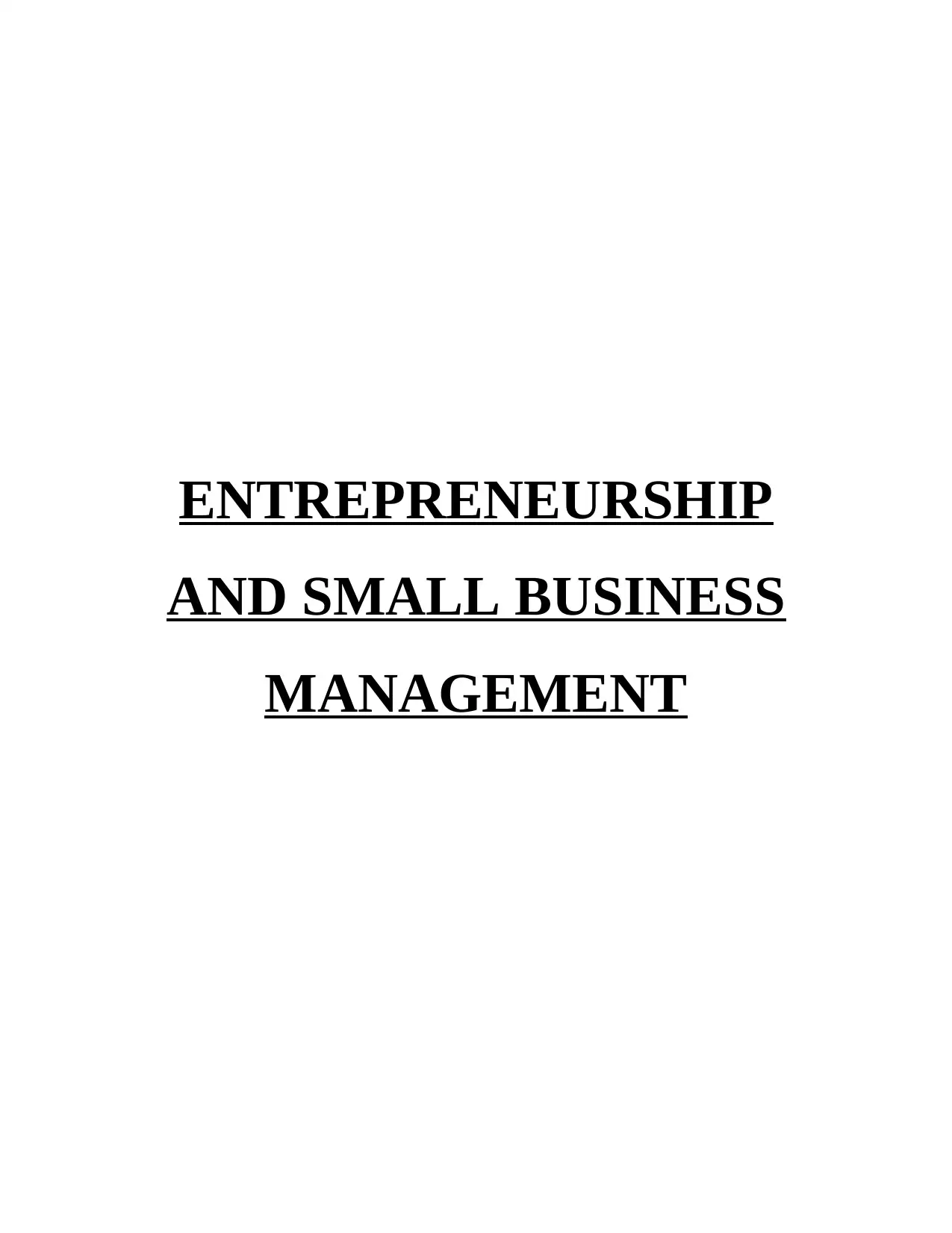
ENTREPRENEURSHIP
AND SMALL BUSINESS
MANAGEMENT
AND SMALL BUSINESS
MANAGEMENT
Paraphrase This Document
Need a fresh take? Get an instant paraphrase of this document with our AI Paraphraser
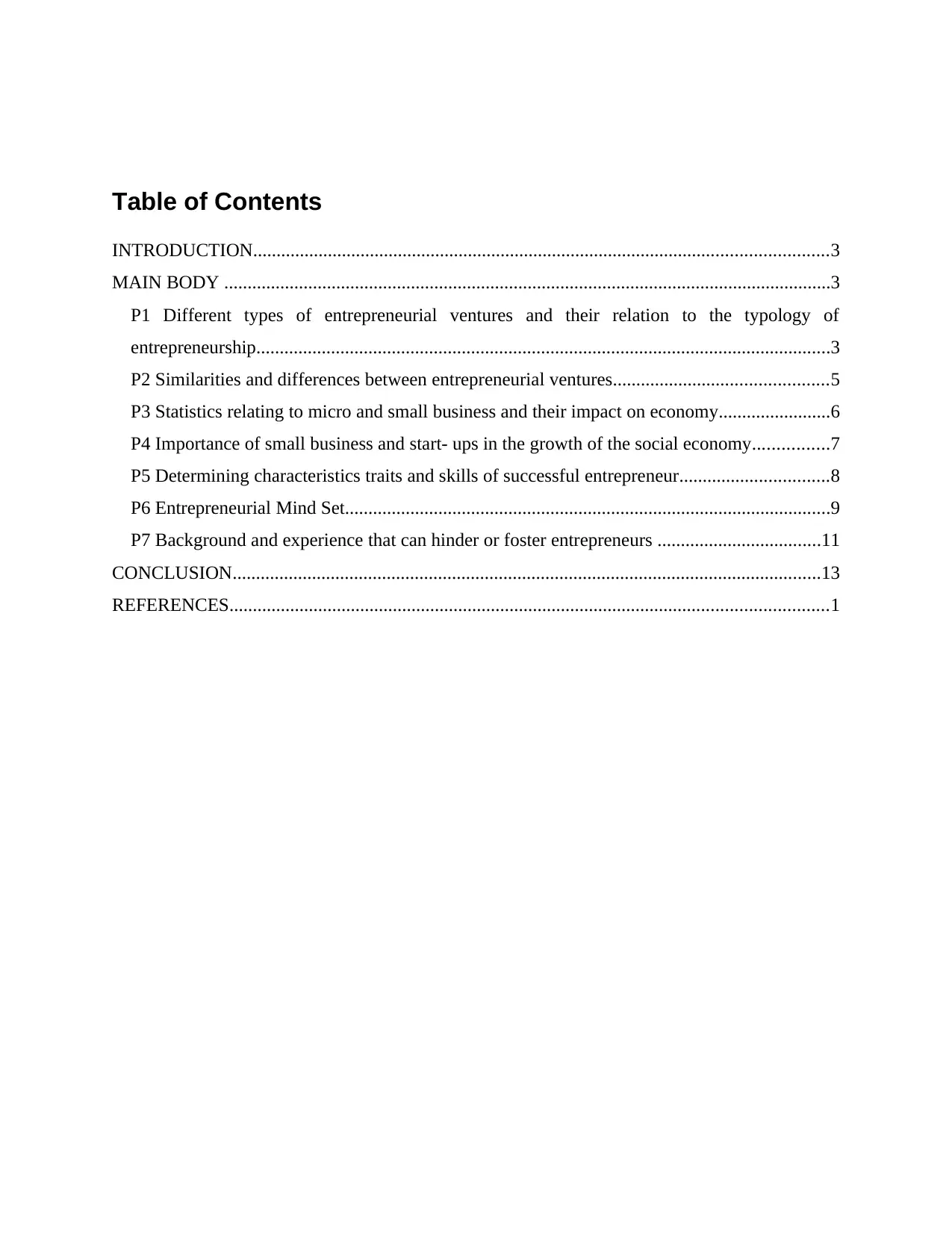
Table of Contents
INTRODUCTION...........................................................................................................................3
MAIN BODY ..................................................................................................................................3
P1 Different types of entrepreneurial ventures and their relation to the typology of
entrepreneurship...........................................................................................................................3
P2 Similarities and differences between entrepreneurial ventures..............................................5
P3 Statistics relating to micro and small business and their impact on economy........................6
P4 Importance of small business and start- ups in the growth of the social economy................7
P5 Determining characteristics traits and skills of successful entrepreneur................................8
P6 Entrepreneurial Mind Set........................................................................................................9
P7 Background and experience that can hinder or foster entrepreneurs ...................................11
CONCLUSION..............................................................................................................................13
REFERENCES................................................................................................................................1
INTRODUCTION...........................................................................................................................3
MAIN BODY ..................................................................................................................................3
P1 Different types of entrepreneurial ventures and their relation to the typology of
entrepreneurship...........................................................................................................................3
P2 Similarities and differences between entrepreneurial ventures..............................................5
P3 Statistics relating to micro and small business and their impact on economy........................6
P4 Importance of small business and start- ups in the growth of the social economy................7
P5 Determining characteristics traits and skills of successful entrepreneur................................8
P6 Entrepreneurial Mind Set........................................................................................................9
P7 Background and experience that can hinder or foster entrepreneurs ...................................11
CONCLUSION..............................................................................................................................13
REFERENCES................................................................................................................................1
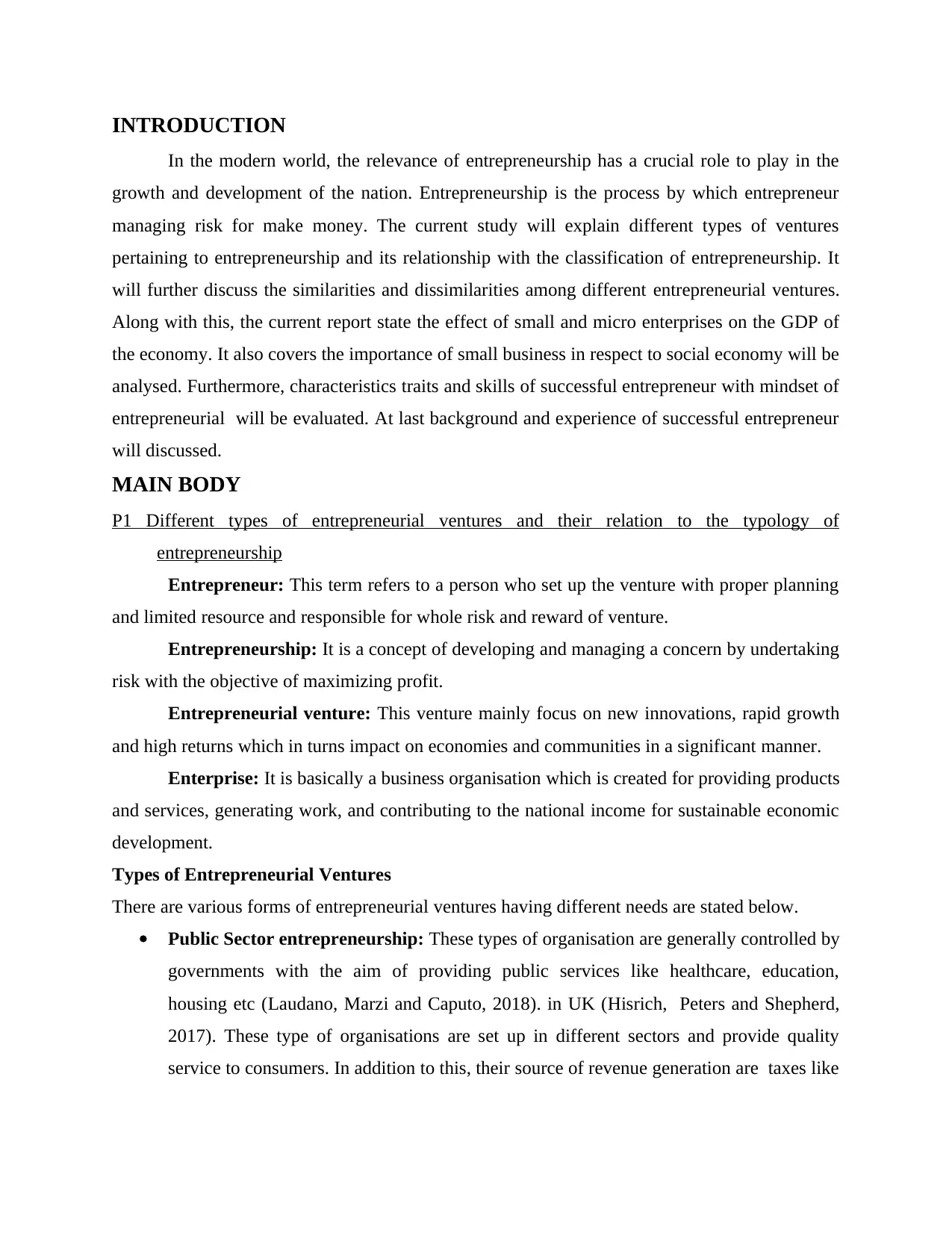
INTRODUCTION
In the modern world, the relevance of entrepreneurship has a crucial role to play in the
growth and development of the nation. Entrepreneurship is the process by which entrepreneur
managing risk for make money. The current study will explain different types of ventures
pertaining to entrepreneurship and its relationship with the classification of entrepreneurship. It
will further discuss the similarities and dissimilarities among different entrepreneurial ventures.
Along with this, the current report state the effect of small and micro enterprises on the GDP of
the economy. It also covers the importance of small business in respect to social economy will be
analysed. Furthermore, characteristics traits and skills of successful entrepreneur with mindset of
entrepreneurial will be evaluated. At last background and experience of successful entrepreneur
will discussed.
MAIN BODY
P1 Different types of entrepreneurial ventures and their relation to the typology of
entrepreneurship
Entrepreneur: This term refers to a person who set up the venture with proper planning
and limited resource and responsible for whole risk and reward of venture.
Entrepreneurship: It is a concept of developing and managing a concern by undertaking
risk with the objective of maximizing profit.
Entrepreneurial venture: This venture mainly focus on new innovations, rapid growth
and high returns which in turns impact on economies and communities in a significant manner.
Enterprise: It is basically a business organisation which is created for providing products
and services, generating work, and contributing to the national income for sustainable economic
development.
Types of Entrepreneurial Ventures
There are various forms of entrepreneurial ventures having different needs are stated below.
Public Sector entrepreneurship: These types of organisation are generally controlled by
governments with the aim of providing public services like healthcare, education,
housing etc (Laudano, Marzi and Caputo, 2018). in UK (Hisrich, Peters and Shepherd,
2017). These type of organisations are set up in different sectors and provide quality
service to consumers. In addition to this, their source of revenue generation are taxes like
In the modern world, the relevance of entrepreneurship has a crucial role to play in the
growth and development of the nation. Entrepreneurship is the process by which entrepreneur
managing risk for make money. The current study will explain different types of ventures
pertaining to entrepreneurship and its relationship with the classification of entrepreneurship. It
will further discuss the similarities and dissimilarities among different entrepreneurial ventures.
Along with this, the current report state the effect of small and micro enterprises on the GDP of
the economy. It also covers the importance of small business in respect to social economy will be
analysed. Furthermore, characteristics traits and skills of successful entrepreneur with mindset of
entrepreneurial will be evaluated. At last background and experience of successful entrepreneur
will discussed.
MAIN BODY
P1 Different types of entrepreneurial ventures and their relation to the typology of
entrepreneurship
Entrepreneur: This term refers to a person who set up the venture with proper planning
and limited resource and responsible for whole risk and reward of venture.
Entrepreneurship: It is a concept of developing and managing a concern by undertaking
risk with the objective of maximizing profit.
Entrepreneurial venture: This venture mainly focus on new innovations, rapid growth
and high returns which in turns impact on economies and communities in a significant manner.
Enterprise: It is basically a business organisation which is created for providing products
and services, generating work, and contributing to the national income for sustainable economic
development.
Types of Entrepreneurial Ventures
There are various forms of entrepreneurial ventures having different needs are stated below.
Public Sector entrepreneurship: These types of organisation are generally controlled by
governments with the aim of providing public services like healthcare, education,
housing etc (Laudano, Marzi and Caputo, 2018). in UK (Hisrich, Peters and Shepherd,
2017). These type of organisations are set up in different sectors and provide quality
service to consumers. In addition to this, their source of revenue generation are taxes like
⊘ This is a preview!⊘
Do you want full access?
Subscribe today to unlock all pages.

Trusted by 1+ million students worldwide
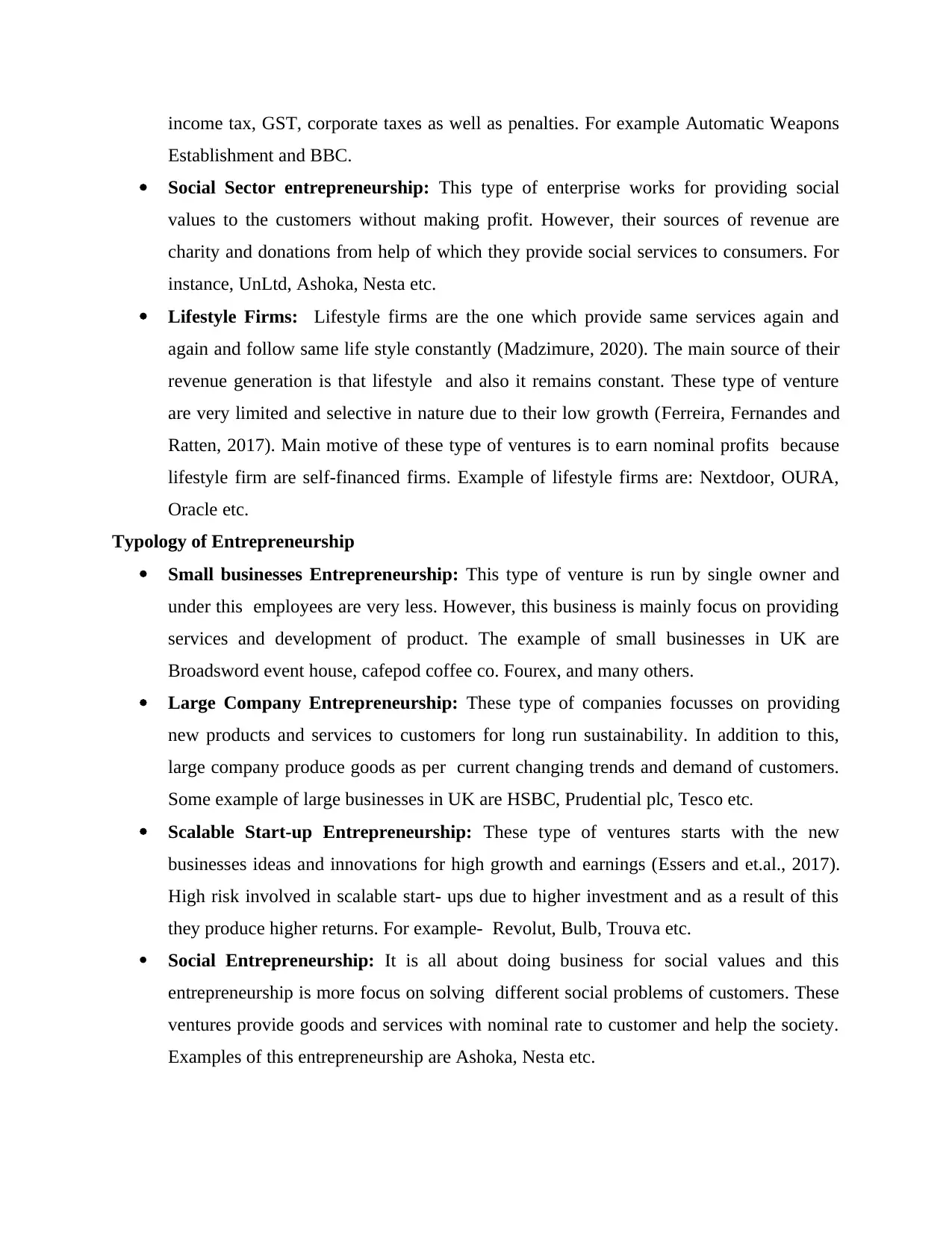
income tax, GST, corporate taxes as well as penalties. For example Automatic Weapons
Establishment and BBC.
Social Sector entrepreneurship: This type of enterprise works for providing social
values to the customers without making profit. However, their sources of revenue are
charity and donations from help of which they provide social services to consumers. For
instance, UnLtd, Ashoka, Nesta etc.
Lifestyle Firms: Lifestyle firms are the one which provide same services again and
again and follow same life style constantly (Madzimure, 2020). The main source of their
revenue generation is that lifestyle and also it remains constant. These type of venture
are very limited and selective in nature due to their low growth (Ferreira, Fernandes and
Ratten, 2017). Main motive of these type of ventures is to earn nominal profits because
lifestyle firm are self-financed firms. Example of lifestyle firms are: Nextdoor, OURA,
Oracle etc.
Typology of Entrepreneurship
Small businesses Entrepreneurship: This type of venture is run by single owner and
under this employees are very less. However, this business is mainly focus on providing
services and development of product. The example of small businesses in UK are
Broadsword event house, cafepod coffee co. Fourex, and many others.
Large Company Entrepreneurship: These type of companies focusses on providing
new products and services to customers for long run sustainability. In addition to this,
large company produce goods as per current changing trends and demand of customers.
Some example of large businesses in UK are HSBC, Prudential plc, Tesco etc.
Scalable Start-up Entrepreneurship: These type of ventures starts with the new
businesses ideas and innovations for high growth and earnings (Essers and et.al., 2017).
High risk involved in scalable start- ups due to higher investment and as a result of this
they produce higher returns. For example- Revolut, Bulb, Trouva etc.
Social Entrepreneurship: It is all about doing business for social values and this
entrepreneurship is more focus on solving different social problems of customers. These
ventures provide goods and services with nominal rate to customer and help the society.
Examples of this entrepreneurship are Ashoka, Nesta etc.
Establishment and BBC.
Social Sector entrepreneurship: This type of enterprise works for providing social
values to the customers without making profit. However, their sources of revenue are
charity and donations from help of which they provide social services to consumers. For
instance, UnLtd, Ashoka, Nesta etc.
Lifestyle Firms: Lifestyle firms are the one which provide same services again and
again and follow same life style constantly (Madzimure, 2020). The main source of their
revenue generation is that lifestyle and also it remains constant. These type of venture
are very limited and selective in nature due to their low growth (Ferreira, Fernandes and
Ratten, 2017). Main motive of these type of ventures is to earn nominal profits because
lifestyle firm are self-financed firms. Example of lifestyle firms are: Nextdoor, OURA,
Oracle etc.
Typology of Entrepreneurship
Small businesses Entrepreneurship: This type of venture is run by single owner and
under this employees are very less. However, this business is mainly focus on providing
services and development of product. The example of small businesses in UK are
Broadsword event house, cafepod coffee co. Fourex, and many others.
Large Company Entrepreneurship: These type of companies focusses on providing
new products and services to customers for long run sustainability. In addition to this,
large company produce goods as per current changing trends and demand of customers.
Some example of large businesses in UK are HSBC, Prudential plc, Tesco etc.
Scalable Start-up Entrepreneurship: These type of ventures starts with the new
businesses ideas and innovations for high growth and earnings (Essers and et.al., 2017).
High risk involved in scalable start- ups due to higher investment and as a result of this
they produce higher returns. For example- Revolut, Bulb, Trouva etc.
Social Entrepreneurship: It is all about doing business for social values and this
entrepreneurship is more focus on solving different social problems of customers. These
ventures provide goods and services with nominal rate to customer and help the society.
Examples of this entrepreneurship are Ashoka, Nesta etc.
Paraphrase This Document
Need a fresh take? Get an instant paraphrase of this document with our AI Paraphraser
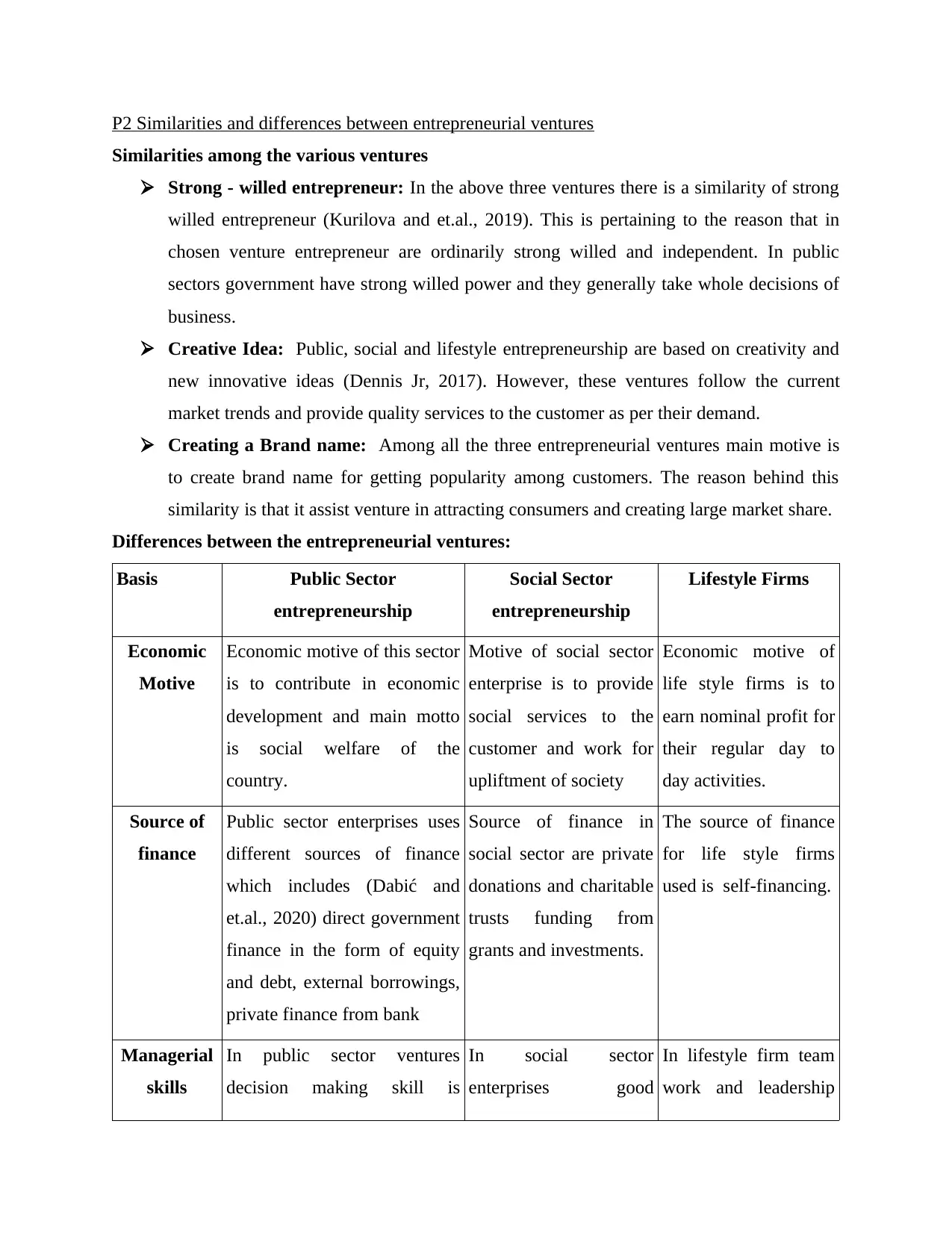
P2 Similarities and differences between entrepreneurial ventures
Similarities among the various ventures
Strong - willed entrepreneur: In the above three ventures there is a similarity of strong
willed entrepreneur (Kurilova and et.al., 2019). This is pertaining to the reason that in
chosen venture entrepreneur are ordinarily strong willed and independent. In public
sectors government have strong willed power and they generally take whole decisions of
business.
Creative Idea: Public, social and lifestyle entrepreneurship are based on creativity and
new innovative ideas (Dennis Jr, 2017). However, these ventures follow the current
market trends and provide quality services to the customer as per their demand.
Creating a Brand name: Among all the three entrepreneurial ventures main motive is
to create brand name for getting popularity among customers. The reason behind this
similarity is that it assist venture in attracting consumers and creating large market share.
Differences between the entrepreneurial ventures:
Basis Public Sector
entrepreneurship
Social Sector
entrepreneurship
Lifestyle Firms
Economic
Motive
Economic motive of this sector
is to contribute in economic
development and main motto
is social welfare of the
country.
Motive of social sector
enterprise is to provide
social services to the
customer and work for
upliftment of society
Economic motive of
life style firms is to
earn nominal profit for
their regular day to
day activities.
Source of
finance
Public sector enterprises uses
different sources of finance
which includes (Dabić and
et.al., 2020) direct government
finance in the form of equity
and debt, external borrowings,
private finance from bank
Source of finance in
social sector are private
donations and charitable
trusts funding from
grants and investments.
The source of finance
for life style firms
used is self-financing.
Managerial
skills
In public sector ventures
decision making skill is
In social sector
enterprises good
In lifestyle firm team
work and leadership
Similarities among the various ventures
Strong - willed entrepreneur: In the above three ventures there is a similarity of strong
willed entrepreneur (Kurilova and et.al., 2019). This is pertaining to the reason that in
chosen venture entrepreneur are ordinarily strong willed and independent. In public
sectors government have strong willed power and they generally take whole decisions of
business.
Creative Idea: Public, social and lifestyle entrepreneurship are based on creativity and
new innovative ideas (Dennis Jr, 2017). However, these ventures follow the current
market trends and provide quality services to the customer as per their demand.
Creating a Brand name: Among all the three entrepreneurial ventures main motive is
to create brand name for getting popularity among customers. The reason behind this
similarity is that it assist venture in attracting consumers and creating large market share.
Differences between the entrepreneurial ventures:
Basis Public Sector
entrepreneurship
Social Sector
entrepreneurship
Lifestyle Firms
Economic
Motive
Economic motive of this sector
is to contribute in economic
development and main motto
is social welfare of the
country.
Motive of social sector
enterprise is to provide
social services to the
customer and work for
upliftment of society
Economic motive of
life style firms is to
earn nominal profit for
their regular day to
day activities.
Source of
finance
Public sector enterprises uses
different sources of finance
which includes (Dabić and
et.al., 2020) direct government
finance in the form of equity
and debt, external borrowings,
private finance from bank
Source of finance in
social sector are private
donations and charitable
trusts funding from
grants and investments.
The source of finance
for life style firms
used is self-financing.
Managerial
skills
In public sector ventures
decision making skill is
In social sector
enterprises good
In lifestyle firm team
work and leadership
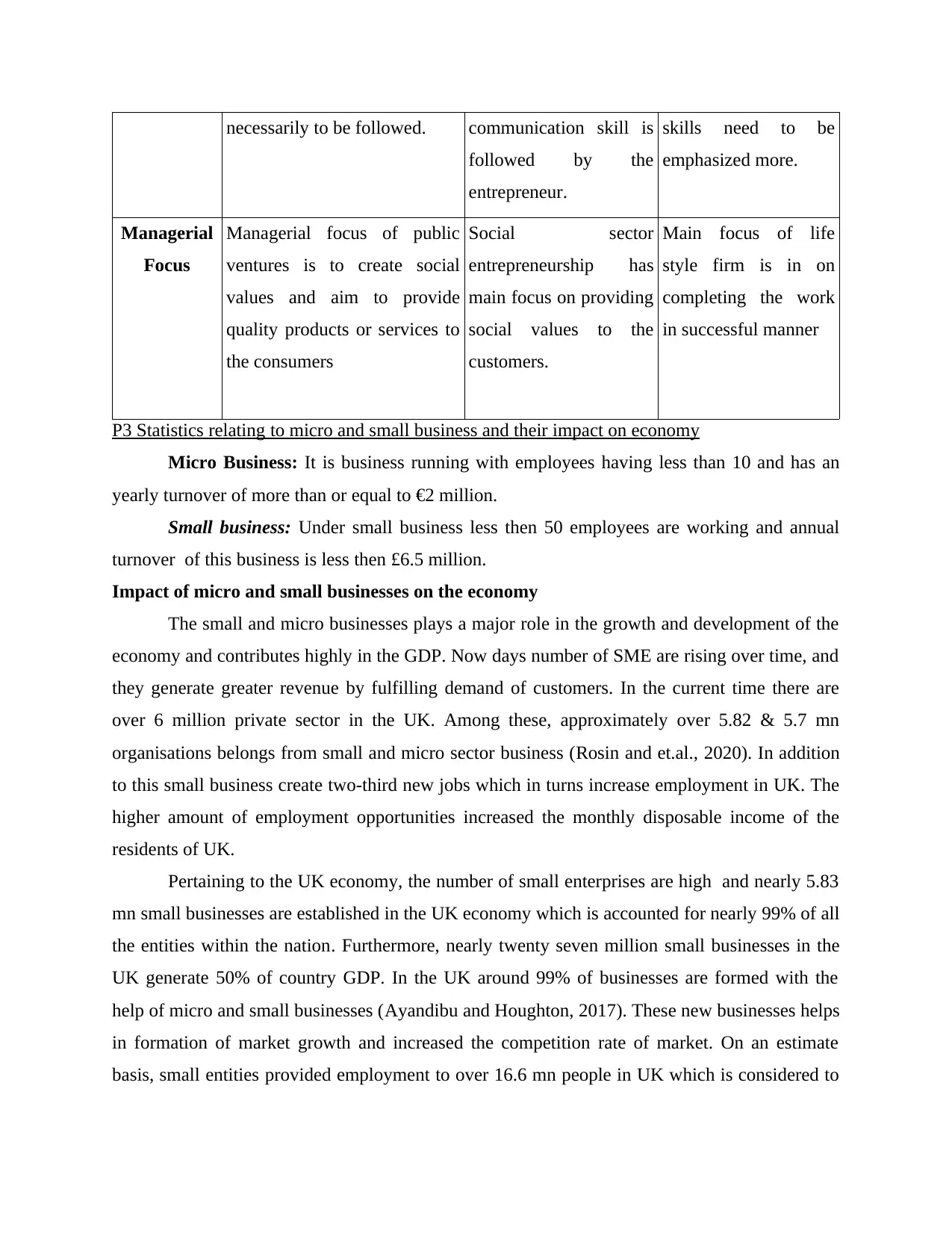
necessarily to be followed. communication skill is
followed by the
entrepreneur.
skills need to be
emphasized more.
Managerial
Focus
Managerial focus of public
ventures is to create social
values and aim to provide
quality products or services to
the consumers
Social sector
entrepreneurship has
main focus on providing
social values to the
customers.
Main focus of life
style firm is in on
completing the work
in successful manner
P3 Statistics relating to micro and small business and their impact on economy
Micro Business: It is business running with employees having less than 10 and has an
yearly turnover of more than or equal to €2 million.
Small business: Under small business less then 50 employees are working and annual
turnover of this business is less then £6.5 million.
Impact of micro and small businesses on the economy
The small and micro businesses plays a major role in the growth and development of the
economy and contributes highly in the GDP. Now days number of SME are rising over time, and
they generate greater revenue by fulfilling demand of customers. In the current time there are
over 6 million private sector in the UK. Among these, approximately over 5.82 & 5.7 mn
organisations belongs from small and micro sector business (Rosin and et.al., 2020). In addition
to this small business create two-third new jobs which in turns increase employment in UK. The
higher amount of employment opportunities increased the monthly disposable income of the
residents of UK.
Pertaining to the UK economy, the number of small enterprises are high and nearly 5.83
mn small businesses are established in the UK economy which is accounted for nearly 99% of all
the entities within the nation. Furthermore, nearly twenty seven million small businesses in the
UK generate 50% of country GDP. In the UK around 99% of businesses are formed with the
help of micro and small businesses (Ayandibu and Houghton, 2017). These new businesses helps
in formation of market growth and increased the competition rate of market. On an estimate
basis, small entities provided employment to over 16.6 mn people in UK which is considered to
followed by the
entrepreneur.
skills need to be
emphasized more.
Managerial
Focus
Managerial focus of public
ventures is to create social
values and aim to provide
quality products or services to
the consumers
Social sector
entrepreneurship has
main focus on providing
social values to the
customers.
Main focus of life
style firm is in on
completing the work
in successful manner
P3 Statistics relating to micro and small business and their impact on economy
Micro Business: It is business running with employees having less than 10 and has an
yearly turnover of more than or equal to €2 million.
Small business: Under small business less then 50 employees are working and annual
turnover of this business is less then £6.5 million.
Impact of micro and small businesses on the economy
The small and micro businesses plays a major role in the growth and development of the
economy and contributes highly in the GDP. Now days number of SME are rising over time, and
they generate greater revenue by fulfilling demand of customers. In the current time there are
over 6 million private sector in the UK. Among these, approximately over 5.82 & 5.7 mn
organisations belongs from small and micro sector business (Rosin and et.al., 2020). In addition
to this small business create two-third new jobs which in turns increase employment in UK. The
higher amount of employment opportunities increased the monthly disposable income of the
residents of UK.
Pertaining to the UK economy, the number of small enterprises are high and nearly 5.83
mn small businesses are established in the UK economy which is accounted for nearly 99% of all
the entities within the nation. Furthermore, nearly twenty seven million small businesses in the
UK generate 50% of country GDP. In the UK around 99% of businesses are formed with the
help of micro and small businesses (Ayandibu and Houghton, 2017). These new businesses helps
in formation of market growth and increased the competition rate of market. On an estimate
basis, small entities provided employment to over 16.6 mn people in UK which is considered to
⊘ This is a preview!⊘
Do you want full access?
Subscribe today to unlock all pages.

Trusted by 1+ million students worldwide
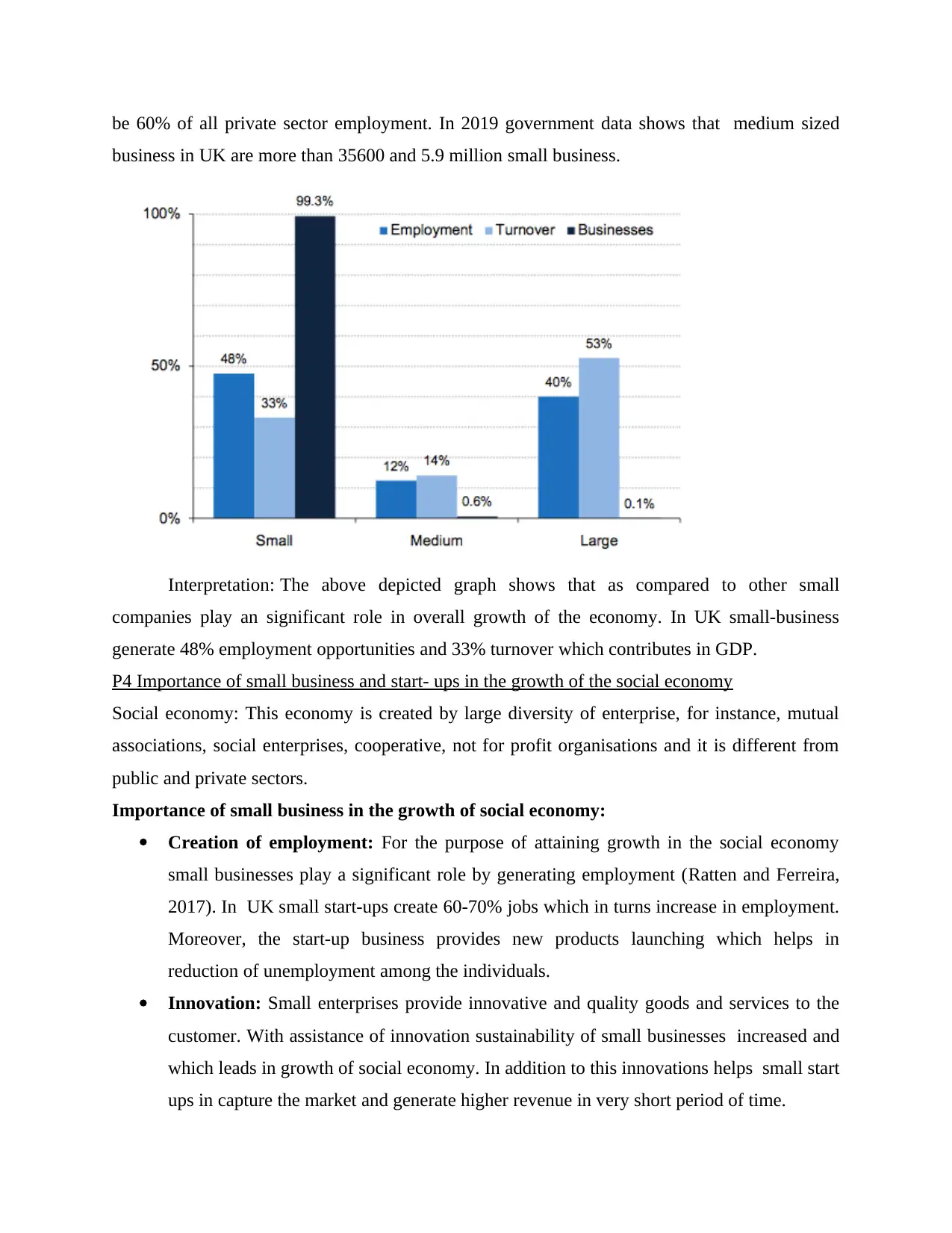
be 60% of all private sector employment. In 2019 government data shows that medium sized
business in UK are more than 35600 and 5.9 million small business.
Interpretation: The above depicted graph shows that as compared to other small
companies play an significant role in overall growth of the economy. In UK small-business
generate 48% employment opportunities and 33% turnover which contributes in GDP.
P4 Importance of small business and start- ups in the growth of the social economy
Social economy: This economy is created by large diversity of enterprise, for instance, mutual
associations, social enterprises, cooperative, not for profit organisations and it is different from
public and private sectors.
Importance of small business in the growth of social economy:
Creation of employment: For the purpose of attaining growth in the social economy
small businesses play a significant role by generating employment (Ratten and Ferreira,
2017). In UK small start-ups create 60-70% jobs which in turns increase in employment.
Moreover, the start-up business provides new products launching which helps in
reduction of unemployment among the individuals.
Innovation: Small enterprises provide innovative and quality goods and services to the
customer. With assistance of innovation sustainability of small businesses increased and
which leads in growth of social economy. In addition to this innovations helps small start
ups in capture the market and generate higher revenue in very short period of time.
business in UK are more than 35600 and 5.9 million small business.
Interpretation: The above depicted graph shows that as compared to other small
companies play an significant role in overall growth of the economy. In UK small-business
generate 48% employment opportunities and 33% turnover which contributes in GDP.
P4 Importance of small business and start- ups in the growth of the social economy
Social economy: This economy is created by large diversity of enterprise, for instance, mutual
associations, social enterprises, cooperative, not for profit organisations and it is different from
public and private sectors.
Importance of small business in the growth of social economy:
Creation of employment: For the purpose of attaining growth in the social economy
small businesses play a significant role by generating employment (Ratten and Ferreira,
2017). In UK small start-ups create 60-70% jobs which in turns increase in employment.
Moreover, the start-up business provides new products launching which helps in
reduction of unemployment among the individuals.
Innovation: Small enterprises provide innovative and quality goods and services to the
customer. With assistance of innovation sustainability of small businesses increased and
which leads in growth of social economy. In addition to this innovations helps small start
ups in capture the market and generate higher revenue in very short period of time.
Paraphrase This Document
Need a fresh take? Get an instant paraphrase of this document with our AI Paraphraser
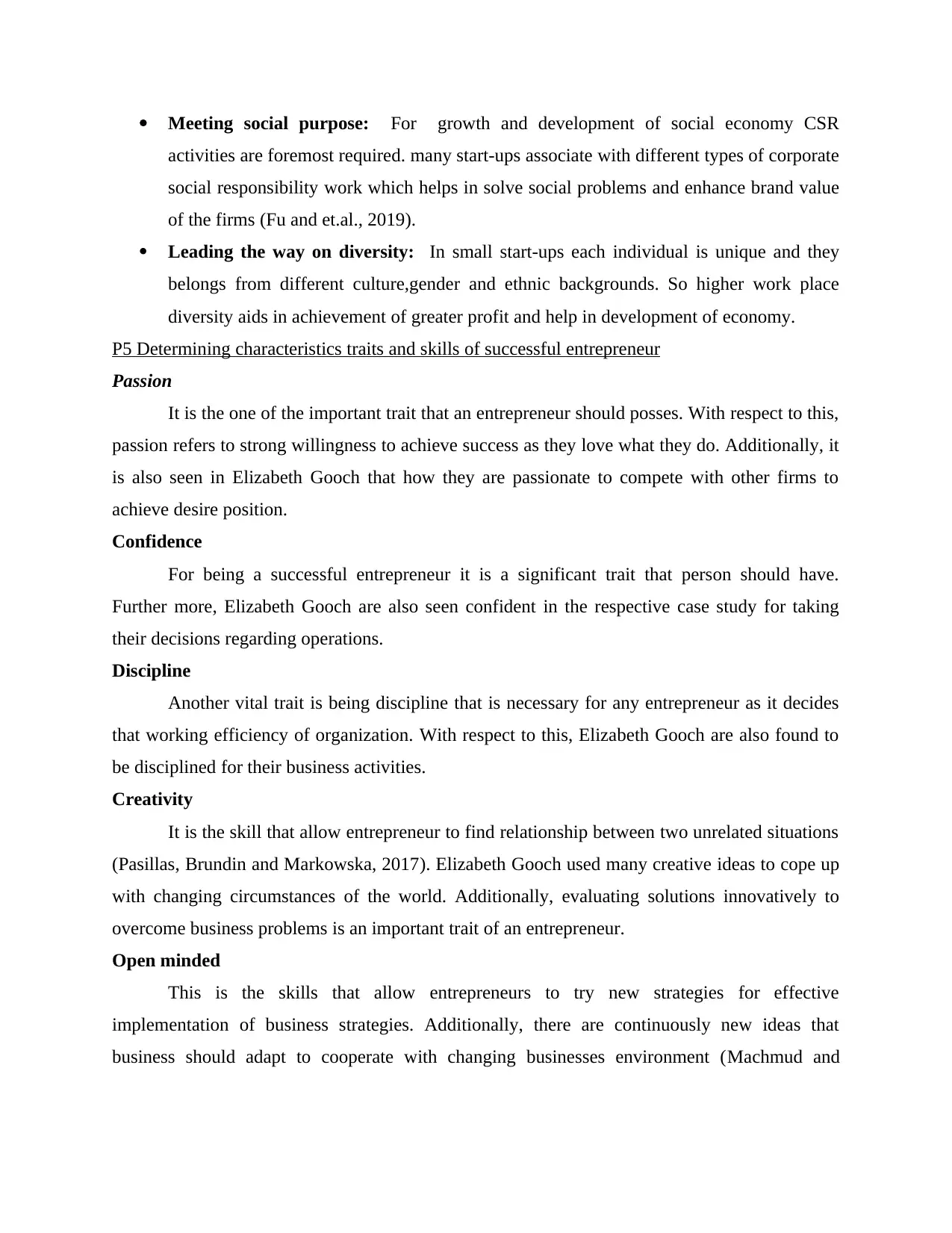
Meeting social purpose: For growth and development of social economy CSR
activities are foremost required. many start-ups associate with different types of corporate
social responsibility work which helps in solve social problems and enhance brand value
of the firms (Fu and et.al., 2019).
Leading the way on diversity: In small start-ups each individual is unique and they
belongs from different culture,gender and ethnic backgrounds. So higher work place
diversity aids in achievement of greater profit and help in development of economy.
P5 Determining characteristics traits and skills of successful entrepreneur
Passion
It is the one of the important trait that an entrepreneur should posses. With respect to this,
passion refers to strong willingness to achieve success as they love what they do. Additionally, it
is also seen in Elizabeth Gooch that how they are passionate to compete with other firms to
achieve desire position.
Confidence
For being a successful entrepreneur it is a significant trait that person should have.
Further more, Elizabeth Gooch are also seen confident in the respective case study for taking
their decisions regarding operations.
Discipline
Another vital trait is being discipline that is necessary for any entrepreneur as it decides
that working efficiency of organization. With respect to this, Elizabeth Gooch are also found to
be disciplined for their business activities.
Creativity
It is the skill that allow entrepreneur to find relationship between two unrelated situations
(Pasillas, Brundin and Markowska, 2017). Elizabeth Gooch used many creative ideas to cope up
with changing circumstances of the world. Additionally, evaluating solutions innovatively to
overcome business problems is an important trait of an entrepreneur.
Open minded
This is the skills that allow entrepreneurs to try new strategies for effective
implementation of business strategies. Additionally, there are continuously new ideas that
business should adapt to cooperate with changing businesses environment (Machmud and
activities are foremost required. many start-ups associate with different types of corporate
social responsibility work which helps in solve social problems and enhance brand value
of the firms (Fu and et.al., 2019).
Leading the way on diversity: In small start-ups each individual is unique and they
belongs from different culture,gender and ethnic backgrounds. So higher work place
diversity aids in achievement of greater profit and help in development of economy.
P5 Determining characteristics traits and skills of successful entrepreneur
Passion
It is the one of the important trait that an entrepreneur should posses. With respect to this,
passion refers to strong willingness to achieve success as they love what they do. Additionally, it
is also seen in Elizabeth Gooch that how they are passionate to compete with other firms to
achieve desire position.
Confidence
For being a successful entrepreneur it is a significant trait that person should have.
Further more, Elizabeth Gooch are also seen confident in the respective case study for taking
their decisions regarding operations.
Discipline
Another vital trait is being discipline that is necessary for any entrepreneur as it decides
that working efficiency of organization. With respect to this, Elizabeth Gooch are also found to
be disciplined for their business activities.
Creativity
It is the skill that allow entrepreneur to find relationship between two unrelated situations
(Pasillas, Brundin and Markowska, 2017). Elizabeth Gooch used many creative ideas to cope up
with changing circumstances of the world. Additionally, evaluating solutions innovatively to
overcome business problems is an important trait of an entrepreneur.
Open minded
This is the skills that allow entrepreneurs to try new strategies for effective
implementation of business strategies. Additionally, there are continuously new ideas that
business should adapt to cooperate with changing businesses environment (Machmud and
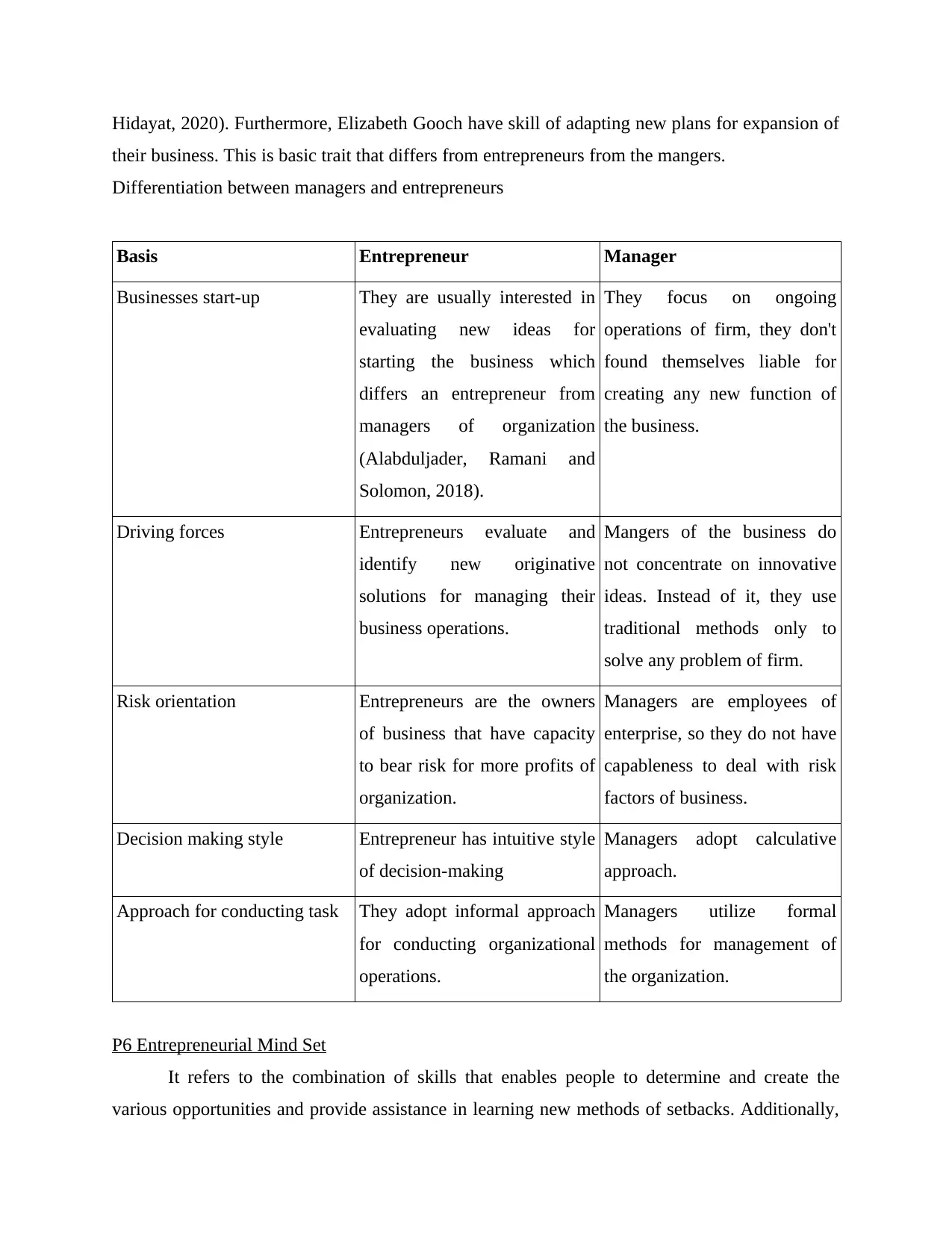
Hidayat, 2020). Furthermore, Elizabeth Gooch have skill of adapting new plans for expansion of
their business. This is basic trait that differs from entrepreneurs from the mangers.
Differentiation between managers and entrepreneurs
Basis Entrepreneur Manager
Businesses start-up They are usually interested in
evaluating new ideas for
starting the business which
differs an entrepreneur from
managers of organization
(Alabduljader, Ramani and
Solomon, 2018).
They focus on ongoing
operations of firm, they don't
found themselves liable for
creating any new function of
the business.
Driving forces Entrepreneurs evaluate and
identify new originative
solutions for managing their
business operations.
Mangers of the business do
not concentrate on innovative
ideas. Instead of it, they use
traditional methods only to
solve any problem of firm.
Risk orientation Entrepreneurs are the owners
of business that have capacity
to bear risk for more profits of
organization.
Managers are employees of
enterprise, so they do not have
capableness to deal with risk
factors of business.
Decision making style Entrepreneur has intuitive style
of decision-making
Managers adopt calculative
approach.
Approach for conducting task They adopt informal approach
for conducting organizational
operations.
Managers utilize formal
methods for management of
the organization.
P6 Entrepreneurial Mind Set
It refers to the combination of skills that enables people to determine and create the
various opportunities and provide assistance in learning new methods of setbacks. Additionally,
their business. This is basic trait that differs from entrepreneurs from the mangers.
Differentiation between managers and entrepreneurs
Basis Entrepreneur Manager
Businesses start-up They are usually interested in
evaluating new ideas for
starting the business which
differs an entrepreneur from
managers of organization
(Alabduljader, Ramani and
Solomon, 2018).
They focus on ongoing
operations of firm, they don't
found themselves liable for
creating any new function of
the business.
Driving forces Entrepreneurs evaluate and
identify new originative
solutions for managing their
business operations.
Mangers of the business do
not concentrate on innovative
ideas. Instead of it, they use
traditional methods only to
solve any problem of firm.
Risk orientation Entrepreneurs are the owners
of business that have capacity
to bear risk for more profits of
organization.
Managers are employees of
enterprise, so they do not have
capableness to deal with risk
factors of business.
Decision making style Entrepreneur has intuitive style
of decision-making
Managers adopt calculative
approach.
Approach for conducting task They adopt informal approach
for conducting organizational
operations.
Managers utilize formal
methods for management of
the organization.
P6 Entrepreneurial Mind Set
It refers to the combination of skills that enables people to determine and create the
various opportunities and provide assistance in learning new methods of setbacks. Additionally,
⊘ This is a preview!⊘
Do you want full access?
Subscribe today to unlock all pages.

Trusted by 1+ million students worldwide
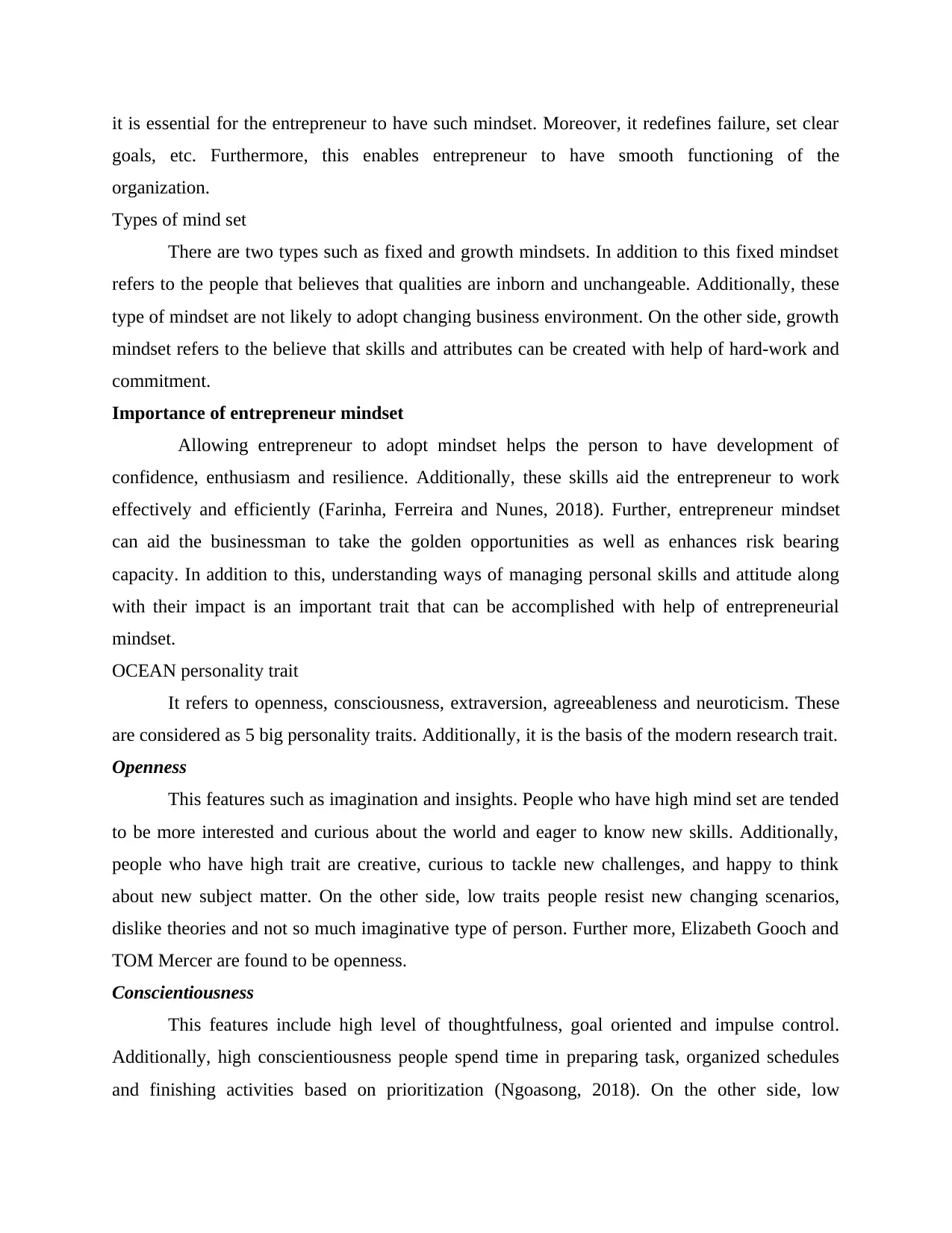
it is essential for the entrepreneur to have such mindset. Moreover, it redefines failure, set clear
goals, etc. Furthermore, this enables entrepreneur to have smooth functioning of the
organization.
Types of mind set
There are two types such as fixed and growth mindsets. In addition to this fixed mindset
refers to the people that believes that qualities are inborn and unchangeable. Additionally, these
type of mindset are not likely to adopt changing business environment. On the other side, growth
mindset refers to the believe that skills and attributes can be created with help of hard-work and
commitment.
Importance of entrepreneur mindset
Allowing entrepreneur to adopt mindset helps the person to have development of
confidence, enthusiasm and resilience. Additionally, these skills aid the entrepreneur to work
effectively and efficiently (Farinha, Ferreira and Nunes, 2018). Further, entrepreneur mindset
can aid the businessman to take the golden opportunities as well as enhances risk bearing
capacity. In addition to this, understanding ways of managing personal skills and attitude along
with their impact is an important trait that can be accomplished with help of entrepreneurial
mindset.
OCEAN personality trait
It refers to openness, consciousness, extraversion, agreeableness and neuroticism. These
are considered as 5 big personality traits. Additionally, it is the basis of the modern research trait.
Openness
This features such as imagination and insights. People who have high mind set are tended
to be more interested and curious about the world and eager to know new skills. Additionally,
people who have high trait are creative, curious to tackle new challenges, and happy to think
about new subject matter. On the other side, low traits people resist new changing scenarios,
dislike theories and not so much imaginative type of person. Further more, Elizabeth Gooch and
TOM Mercer are found to be openness.
Conscientiousness
This features include high level of thoughtfulness, goal oriented and impulse control.
Additionally, high conscientiousness people spend time in preparing task, organized schedules
and finishing activities based on prioritization (Ngoasong, 2018). On the other side, low
goals, etc. Furthermore, this enables entrepreneur to have smooth functioning of the
organization.
Types of mind set
There are two types such as fixed and growth mindsets. In addition to this fixed mindset
refers to the people that believes that qualities are inborn and unchangeable. Additionally, these
type of mindset are not likely to adopt changing business environment. On the other side, growth
mindset refers to the believe that skills and attributes can be created with help of hard-work and
commitment.
Importance of entrepreneur mindset
Allowing entrepreneur to adopt mindset helps the person to have development of
confidence, enthusiasm and resilience. Additionally, these skills aid the entrepreneur to work
effectively and efficiently (Farinha, Ferreira and Nunes, 2018). Further, entrepreneur mindset
can aid the businessman to take the golden opportunities as well as enhances risk bearing
capacity. In addition to this, understanding ways of managing personal skills and attitude along
with their impact is an important trait that can be accomplished with help of entrepreneurial
mindset.
OCEAN personality trait
It refers to openness, consciousness, extraversion, agreeableness and neuroticism. These
are considered as 5 big personality traits. Additionally, it is the basis of the modern research trait.
Openness
This features such as imagination and insights. People who have high mind set are tended
to be more interested and curious about the world and eager to know new skills. Additionally,
people who have high trait are creative, curious to tackle new challenges, and happy to think
about new subject matter. On the other side, low traits people resist new changing scenarios,
dislike theories and not so much imaginative type of person. Further more, Elizabeth Gooch and
TOM Mercer are found to be openness.
Conscientiousness
This features include high level of thoughtfulness, goal oriented and impulse control.
Additionally, high conscientiousness people spend time in preparing task, organized schedules
and finishing activities based on prioritization (Ngoasong, 2018). On the other side, low
Paraphrase This Document
Need a fresh take? Get an instant paraphrase of this document with our AI Paraphraser
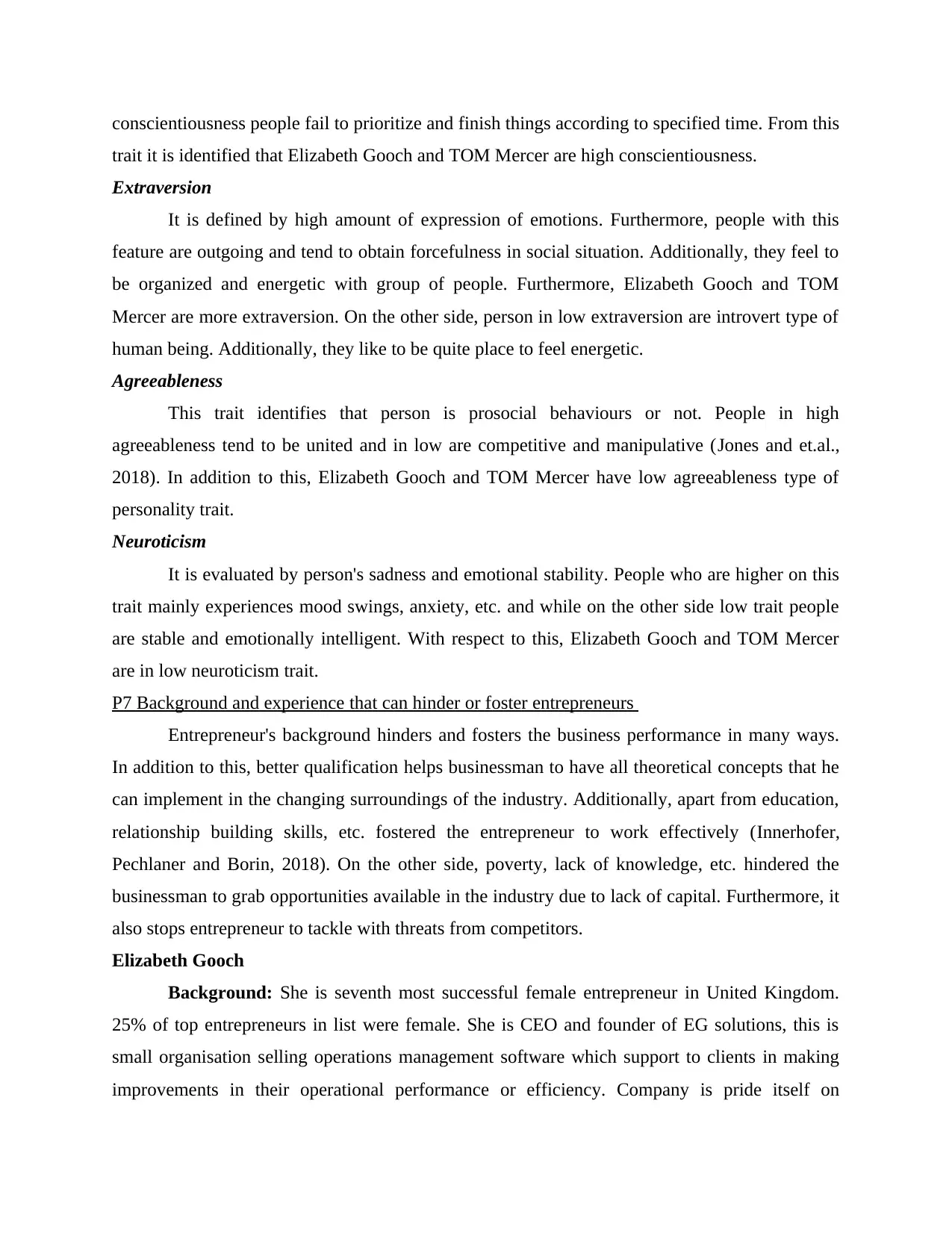
conscientiousness people fail to prioritize and finish things according to specified time. From this
trait it is identified that Elizabeth Gooch and TOM Mercer are high conscientiousness.
Extraversion
It is defined by high amount of expression of emotions. Furthermore, people with this
feature are outgoing and tend to obtain forcefulness in social situation. Additionally, they feel to
be organized and energetic with group of people. Furthermore, Elizabeth Gooch and TOM
Mercer are more extraversion. On the other side, person in low extraversion are introvert type of
human being. Additionally, they like to be quite place to feel energetic.
Agreeableness
This trait identifies that person is prosocial behaviours or not. People in high
agreeableness tend to be united and in low are competitive and manipulative (Jones and et.al.,
2018). In addition to this, Elizabeth Gooch and TOM Mercer have low agreeableness type of
personality trait.
Neuroticism
It is evaluated by person's sadness and emotional stability. People who are higher on this
trait mainly experiences mood swings, anxiety, etc. and while on the other side low trait people
are stable and emotionally intelligent. With respect to this, Elizabeth Gooch and TOM Mercer
are in low neuroticism trait.
P7 Background and experience that can hinder or foster entrepreneurs
Entrepreneur's background hinders and fosters the business performance in many ways.
In addition to this, better qualification helps businessman to have all theoretical concepts that he
can implement in the changing surroundings of the industry. Additionally, apart from education,
relationship building skills, etc. fostered the entrepreneur to work effectively (Innerhofer,
Pechlaner and Borin, 2018). On the other side, poverty, lack of knowledge, etc. hindered the
businessman to grab opportunities available in the industry due to lack of capital. Furthermore, it
also stops entrepreneur to tackle with threats from competitors.
Elizabeth Gooch
Background: She is seventh most successful female entrepreneur in United Kingdom.
25% of top entrepreneurs in list were female. She is CEO and founder of EG solutions, this is
small organisation selling operations management software which support to clients in making
improvements in their operational performance or efficiency. Company is pride itself on
trait it is identified that Elizabeth Gooch and TOM Mercer are high conscientiousness.
Extraversion
It is defined by high amount of expression of emotions. Furthermore, people with this
feature are outgoing and tend to obtain forcefulness in social situation. Additionally, they feel to
be organized and energetic with group of people. Furthermore, Elizabeth Gooch and TOM
Mercer are more extraversion. On the other side, person in low extraversion are introvert type of
human being. Additionally, they like to be quite place to feel energetic.
Agreeableness
This trait identifies that person is prosocial behaviours or not. People in high
agreeableness tend to be united and in low are competitive and manipulative (Jones and et.al.,
2018). In addition to this, Elizabeth Gooch and TOM Mercer have low agreeableness type of
personality trait.
Neuroticism
It is evaluated by person's sadness and emotional stability. People who are higher on this
trait mainly experiences mood swings, anxiety, etc. and while on the other side low trait people
are stable and emotionally intelligent. With respect to this, Elizabeth Gooch and TOM Mercer
are in low neuroticism trait.
P7 Background and experience that can hinder or foster entrepreneurs
Entrepreneur's background hinders and fosters the business performance in many ways.
In addition to this, better qualification helps businessman to have all theoretical concepts that he
can implement in the changing surroundings of the industry. Additionally, apart from education,
relationship building skills, etc. fostered the entrepreneur to work effectively (Innerhofer,
Pechlaner and Borin, 2018). On the other side, poverty, lack of knowledge, etc. hindered the
businessman to grab opportunities available in the industry due to lack of capital. Furthermore, it
also stops entrepreneur to tackle with threats from competitors.
Elizabeth Gooch
Background: She is seventh most successful female entrepreneur in United Kingdom.
25% of top entrepreneurs in list were female. She is CEO and founder of EG solutions, this is
small organisation selling operations management software which support to clients in making
improvements in their operational performance or efficiency. Company is pride itself on
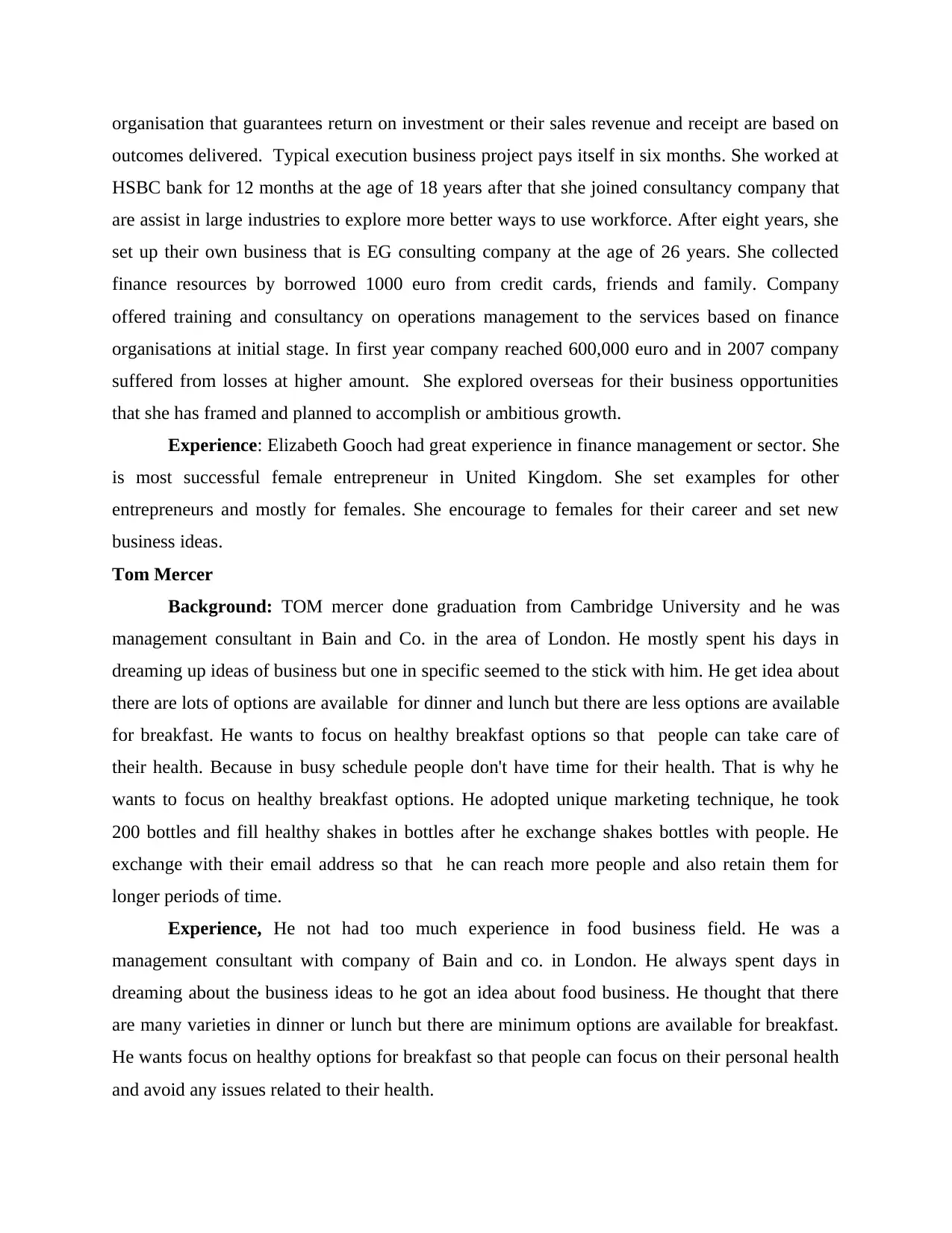
organisation that guarantees return on investment or their sales revenue and receipt are based on
outcomes delivered. Typical execution business project pays itself in six months. She worked at
HSBC bank for 12 months at the age of 18 years after that she joined consultancy company that
are assist in large industries to explore more better ways to use workforce. After eight years, she
set up their own business that is EG consulting company at the age of 26 years. She collected
finance resources by borrowed 1000 euro from credit cards, friends and family. Company
offered training and consultancy on operations management to the services based on finance
organisations at initial stage. In first year company reached 600,000 euro and in 2007 company
suffered from losses at higher amount. She explored overseas for their business opportunities
that she has framed and planned to accomplish or ambitious growth.
Experience: Elizabeth Gooch had great experience in finance management or sector. She
is most successful female entrepreneur in United Kingdom. She set examples for other
entrepreneurs and mostly for females. She encourage to females for their career and set new
business ideas.
Tom Mercer
Background: TOM mercer done graduation from Cambridge University and he was
management consultant in Bain and Co. in the area of London. He mostly spent his days in
dreaming up ideas of business but one in specific seemed to the stick with him. He get idea about
there are lots of options are available for dinner and lunch but there are less options are available
for breakfast. He wants to focus on healthy breakfast options so that people can take care of
their health. Because in busy schedule people don't have time for their health. That is why he
wants to focus on healthy breakfast options. He adopted unique marketing technique, he took
200 bottles and fill healthy shakes in bottles after he exchange shakes bottles with people. He
exchange with their email address so that he can reach more people and also retain them for
longer periods of time.
Experience, He not had too much experience in food business field. He was a
management consultant with company of Bain and co. in London. He always spent days in
dreaming about the business ideas to he got an idea about food business. He thought that there
are many varieties in dinner or lunch but there are minimum options are available for breakfast.
He wants focus on healthy options for breakfast so that people can focus on their personal health
and avoid any issues related to their health.
outcomes delivered. Typical execution business project pays itself in six months. She worked at
HSBC bank for 12 months at the age of 18 years after that she joined consultancy company that
are assist in large industries to explore more better ways to use workforce. After eight years, she
set up their own business that is EG consulting company at the age of 26 years. She collected
finance resources by borrowed 1000 euro from credit cards, friends and family. Company
offered training and consultancy on operations management to the services based on finance
organisations at initial stage. In first year company reached 600,000 euro and in 2007 company
suffered from losses at higher amount. She explored overseas for their business opportunities
that she has framed and planned to accomplish or ambitious growth.
Experience: Elizabeth Gooch had great experience in finance management or sector. She
is most successful female entrepreneur in United Kingdom. She set examples for other
entrepreneurs and mostly for females. She encourage to females for their career and set new
business ideas.
Tom Mercer
Background: TOM mercer done graduation from Cambridge University and he was
management consultant in Bain and Co. in the area of London. He mostly spent his days in
dreaming up ideas of business but one in specific seemed to the stick with him. He get idea about
there are lots of options are available for dinner and lunch but there are less options are available
for breakfast. He wants to focus on healthy breakfast options so that people can take care of
their health. Because in busy schedule people don't have time for their health. That is why he
wants to focus on healthy breakfast options. He adopted unique marketing technique, he took
200 bottles and fill healthy shakes in bottles after he exchange shakes bottles with people. He
exchange with their email address so that he can reach more people and also retain them for
longer periods of time.
Experience, He not had too much experience in food business field. He was a
management consultant with company of Bain and co. in London. He always spent days in
dreaming about the business ideas to he got an idea about food business. He thought that there
are many varieties in dinner or lunch but there are minimum options are available for breakfast.
He wants focus on healthy options for breakfast so that people can focus on their personal health
and avoid any issues related to their health.
⊘ This is a preview!⊘
Do you want full access?
Subscribe today to unlock all pages.

Trusted by 1+ million students worldwide
1 out of 16
Related Documents
Your All-in-One AI-Powered Toolkit for Academic Success.
+13062052269
info@desklib.com
Available 24*7 on WhatsApp / Email
![[object Object]](/_next/static/media/star-bottom.7253800d.svg)
Unlock your academic potential
Copyright © 2020–2026 A2Z Services. All Rights Reserved. Developed and managed by ZUCOL.





